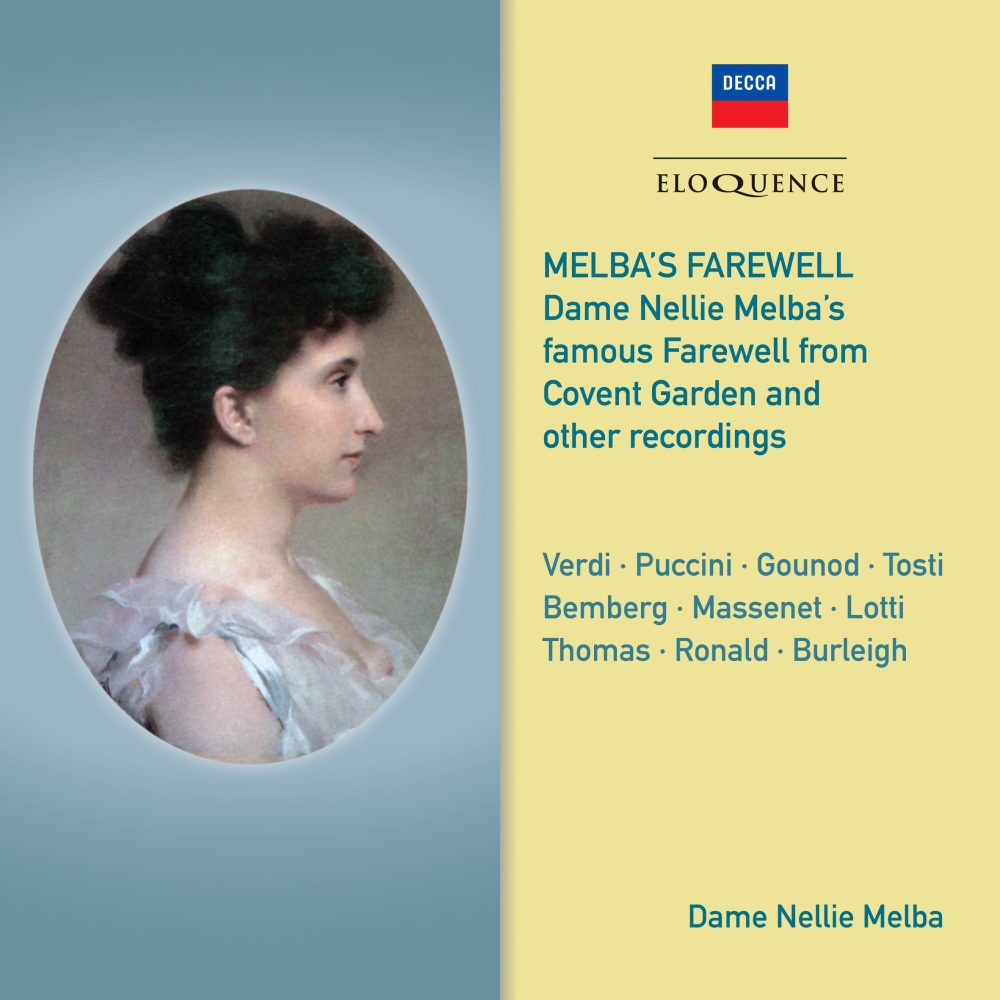The farewell performance of Dame Nellie Melba, world-famous prima donna of her day, on the stage of the Royal Opera House, Covent Garden, where she had sung hundreds of times over an unprecedented span of 40 years, remains a justly famous occasion, of which recorded extracts have been reissued previously. What makes the present release unique?
Firstly, it presents everything that the experimental electrical recording process captured on that evening of 8th June, 1926: excerpts from the roles of Desdemona and Mimì and speeches by Lord Stanley and Dame Nellie herself, ending in tears. Secondly, the original sources are as reliable and clear as may be found today, supplied by the Historic Singers Charitable Trust. Thirdly, those sources have been newly remastered for the first time at the ‘French’ pitch which Melba herself used, rather than the slightly higher concert pitch which is now ubiquitous both in live performances and on record.
The ‘Farewell’ portion of this Eloquence release is complemented by both Melba’s last recording, made six months later and by the fascinating comparison which may then be made with some of her earliest studio recordings from 1904–10. If nothing else, these arias and songs bear out the astonishment of many listeners both at the time of Melba’s farewell and ever since, at the remarkable preservation of her voice and of its sovereign qualities of steadiness, purity and beauty.
Gramophone’s principal vocal critic at the time was Herman Klein who was apt to compare the recordings of singers with their vocal performance on stage, often unfavourably. Yet when the first records of the ‘Farewell’ were issued, in October 1931, he was unequivocal: they were ‘a remarkably true and faithful reproduction of the voice and method of the last of the Victorian prima donnas; and as such they are bound for all time to command grateful appreciation’.
The presentation of this reissue includes several rarely seen photographs of Melba and a detailed note by the historian of voices Roger Neill who co-compiled the 4CD Eloquence set of ‘From Melba to Sutherland: Australian Singers on Record’ (482 5892). That set was widely acclaimed for the excellence of both recordings and documentation: ‘magnificently curated’ (Limelight); ‘an absolute must-have’ (Gramophone); ‘an astonishing and enthralling cavalcade’ (Opera magazine). ‘Melba’s Farewell’ is sure to attract the same accolades.
MELBA’S FAREWELL
Recorded live at the Royal Opera House, Covent Garden, 8 June 1926
GIUSEPPE VERDI: Otello (excerpts)
GIACOMO PUCCINI: La bohème (excerpts)
Address by Lord Stanley of Alderley
Dame Nellie Melba’s Farewell Speech
EARLIER STUDIO RECORDINGS – OPERA
CHARLES GOUNOD: Faust (excerpts)
BEMBERG: Elaine: L’amour est pur comme la flamme
JULES MASSENET: Don Cézar de Bazan: À Séville belles Señoras
GIACOMO PUCCINI: Tosca: Vissi d’arte (Act II)
ANTONIO LOTTI: L’infedeltà punita: Pur dicesti, o bocca, bocca bella
Distance tests Vocalises on phrases from Thomas’ Hamlet Mad Scene
EARLIER STUDIO RECORDINGS – SONG
PAOLO TOSTI:
La serenata
Goodbye
RONALD: The Sounds of Earth Grow Faint (No. 4 from ‘Four Impressions’)
BURLEIGH: Jean
MELBA’s LAST RECORDING
TRADITIONAL (arr. Burleigh): Swing low, sweet chariot
Dame Nellie Melba, soprano
with associate artists
Transfers, Audio Restoration and Digital Remastering: Roger Beardsley for Historic Masters and Brian Slade for Historic Singers Charitable Trust
‘The youthful purity and freshness of tone revealed in these records is astonishing,’ Opera magazine, February 1955
‘The amazing thing is that she could still sing with power authority and almost the quality of her best years, at the age of 65…’ Gramophone, September 1961

